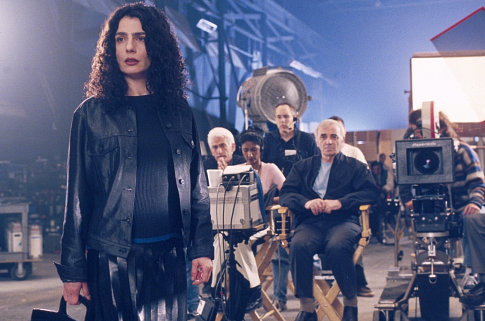 Atom
Egoyan's (The Sweet Hereafter,
The Captive) Ararat is
a drama which obviously must have been one he was trying to knock out
of the park, but instead feels more like a bloop single., and while it
is more hit than miss, it just wasn't enough to score.
Atom
Egoyan's (The Sweet Hereafter,
The Captive) Ararat is
a drama which obviously must have been one he was trying to knock out
of the park, but instead feels more like a bloop single., and while it
is more hit than miss, it just wasn't enough to score.
The reasons
behind the making of the film are obvious given Egoyan's background,
being of Armenian descent, and like Spielberg did with
Schindler's List, he depicts the
attempted genocide of his people around the time of World War I by the
Turks. Over a million Armenians were slaughtered, a fact that
the Turkish government still denies today, and this mystery of history
is the one in which the film tries to uncover.
Ararat
is sort of a film within a film, centering around a film production
developing a film about the Armenian tragedy, developed by esteemed
director Edward Saroyan (Aznavour, The Tin Drum). In an
attempt to bring a more human face to the slaughter, Saroyan brings in
a historian, an Armenian woman named Ani (Khanjian,
Irma Vep), to serve as an advisor to
the film, since she is an expert on the life of painter Arshile Gorky
(Abkarian, When the Cat's Away),
reported to have eye witnessed the events, and who is to be featured
in a supporting role.
While the film is wrapping up, Ani's son
Raffi (Alpay, Man of the Year)
finds a calling to travel to the lands where the events took
place in hopes of finding footage for the film, and more importantly,
perspective on his life and those of his people, although his
step-sister (and lover) Celia (Croze,
Battlefield Earth)
has made it her mission to discredit Ani as the woman who drove her
father to commit suicide. Raffi is stopped by a snooping customs
agent while trying to bring the footage back into Canada, and there
the flashbacks take place while trying to uncover many truths about
Raffi, his mother, his father, and his people.
With such an
ambitious endeavor, it must be said that Egoyan had his heart in the
right place in making this film. However, it seems as though he
understood that this was an emotional subject for him, and in trying
not to put too much emotion into his film, he actually stripped away
almost any semblance of feeling to the affair. The cast of fine
actors perform woodenly, delivering lines with little trace of the
emotion they might be feeling, and many scenes play out in static
fashion, looking like two people in a staring match whose mouths move
in alternating fashion, reciting lines of the script.
There are
some moments later depicting scenes of the Armenians being raped,
tortured and killed in the most brutal of fashions, no doubt meant to
shock and disturb us, but curiously lack the emotional context.
Yet, the film they are making looks phony, with goofy moustaches and
make-up, almost like the production of a Movie-of-the-Week than
Schindler's List. Egoyan admirably tries to show
the other side of the coin, with a character of Turkish descent who
argues the flip side, claiming that the Turks felt threatened by the
Armenians, and killed them in the name of self-preservation.
Although this is summarily refuted by the film later, it does somehow
deflate momentum, until Egoyan's heartfelt film becomes an exercise in
exploration, never driving home any lasting message or memorable
images that would seek to help us sympathize with the plight of a
people who were victims of such unfathomable hate.
In the end,
Egoyan does create a successful film, because it does bring to light
an event that seems curiously ignored by most history books, and
overshadowed by the Holocaust which would happen over twenty years
later. There is also a nice recurring theme of trust and belief
that resonates strongly amid all of the smaller storylines that nicely
supports the film's main event. There should be no shame for
Egoyan in his attempt to create a testament of his ancestors.
Try as he might, Ararat falls short of greatness
because it's ultimately an intellectual rendering of a film where
emotion should have reigned supreme.

 Atom
Egoyan's (
Atom
Egoyan's (